WordPress site owners know the importance of keeping their websites up to date. Plugins, themes, and the WordPress core require the latest versions to ensure a safe browsing experience for site visitors. In addition, when you keep your sites up to date, security risks drop dramatically. Although updating plugins and themes isn’t difficult, it can be overwhelming when you have to keep up with dozens or even hundreds of websites. In this post, we’ll give you our top 10 picks for the best WordPress site management tools to help you quickly lessen the burden of keeping multiple websites up to date.
Let’s get started.
What are WordPress Site Management Tools?
Before we get to the best of the best, let’s delve into what WordPress site management tools are. These tools simplify managing, monitoring, and maintaining multiple WordPress websites. With features such as updating WordPress core, themes, and plugins, performing backups, managing security, and monitoring site performance, WordPress site management tools are a massive time saver. By automating mundane tasks and providing a central location to view and manage your websites, you can reduce the risk of common site errors and make site management a breeze.
Subscribe To Our Youtube Channel
10 Best WordPress Site Management Tools
When we set out to find the best WordPress site management tools, we considered several factors. We thoroughly tested numerous platforms to determine which had the most features, the most reasonable pricing, and the most accessible interfaces. With that in mind, let’s review our top 10.
The Best WordPress Site Management Tools Listed In Order
1. Divi Dash
🥇 Best WordPress Site Manager Overall
Divi Dash is a game-changer for WordPress site management. This tool is free for Divi members and offers a central hub for overseeing multiple websites. Even if you’re not a Divi user, you can perfectly use Divi Dash to host all of your WordPress websites. Perfect for freelancers and agencies, it streamlines maintenance tasks through an intuitive dashboard.
Key features include automated updates, bulk management tools, and simplified user administration. The platform allows easy user addition or removal, single-click logins, and custom permissions for team collaboration.
Within Divi Dash, each site gets its own health report and management options. Users can tag and organize websites by client, making navigation a breeze. The tool also supports team collaboration through Divi Teams.
Divi Dash provides a comprehensive view of themes and plugins across all sites, facilitating easy updates. Additional perks include database cleanup tools and activity tracking.
With plans for uptime monitoring, analytics, and vulnerability reporting, Divi Dash is set to become an essential tool for web design businesses. It offers an efficient, all-in-one solution for WordPress site management, saving time and simplifying complex tasks.
Key Features of Divi Dash:
- Single Click Login
- Manage Updates
- Custom Schedules
- Detailed Insights
- Divi Teams Integration
Pros
- Ease of Use: You can easily add and manage websites with a straightforward interface that doesn’t require much learning. If you’re familiar with Divi, navigating Divi Dash will be even simpler.
- Cloud-Hosted: Unlike many WordPress management services, Divi Dash is hosted on our servers helping you to preserve resources.
- Centralized Management: Manage all your WordPress websites from a single dashboard, saving you time and effort. Additionally, it integrates with Divi Teams, giving you more flexibility.
- Increased Efficiency: With a single click, you can perform bulk updates and maintenance tasks across multiple websites. Additionally, you can schedule and automate updates for WordPress core, themes, and plugins.
- Free with Divi Membership: Divi Dash enhances your current membership without any extra charge.
Cons
- Not Standalone: Using Divi Dash requires a Divi membership, which gives you access to Divi Dash, Theme, and a lot more.
🥇 Why We Picked It
Divi Dash stands out as the top WordPress site management tool because it brings all your website upkeep tasks, such as updates, user roles, and theme/plugin management, into one convenient location. This saves you time and smooths your workflow. It’s available for free with a Divi membership and works with any WordPress site, making it perfect for boosting your productivity as a Divi user.
Who Is Divi Dash Best For?
Divi Dash suits web designers and developers who manage numerous WordPress sites. It simplifies tasks such as updates, user management, and plugin handling, making your work more efficient and saving you time, all while costing you nothing extra. Divi Dash could be an excellent choice whether you’re a newcomer or considering switching from another site manager.
Community Reviews And Ratings
The ongoing upgrades, exceptional front-end page-building experience, and outstanding customer support provided by Divi continue to receive praise from the community.
Pricing
Divi Dash is currently free of cost for all Divi users. Divi licenses start at $89 per year.
2. MainWP
🥈 Best WordPress Site Manager for Ease
Our top pick for the best WordPress site management tool is MainWP, and with good reason. It offers an extensive range of free features, such as an uptime monitor, scheduled backups, Jetpack, Sucuri security scanning, and a site vulnerability checker. MainWP allows you to easily update plugins and themes, manage users, and easily import and export websites.
One of MainWP’s standout features is its user-friendly interface. With an intuitive dashboard, managing multiple plugin or theme updates can be done with just one click. Organizing sites using tags, keeping notes for better organization, and effortlessly managing clients and users are also made possible with MainWP. Additionally, publishing, editing, unpublishing, or deleting posts and pages is a breeze, making post and page management fast and effective.
MainWP’s setup involves creating a new WordPress install and installing the MainWP Dashboard plugin. Afterward, the MainWP Child plugin is installed on each site you want to manage. MainWP ensures security by utilizing OpenSSL encryption, which means that once a child site is connected, it will only accept requests from that dashboard, making it a secure way to manage all your sites. Although the initial setup takes time and effort, the time-saving benefits make it well worth it in the long run.
Key Features of MainWP:
- One-click access to each website (no password required)
- Security scans
- Import/Export sites
- Health check
- Bulk updates
Pros
- Self-Hosted Platform: MainWP is fully self-hosted, so all your data stays on your servers. This is great for those who worry about data privacy and security. Unlike SaaS tools like ManageWP, your website data isn’t kept on a third-party server, giving you more control over your information.
- Flexible Integrations: With MainWP, you can keep using your current plugins and tools for backups, security, SEO, and performance optimization. This flexibility lets you integrate tools like UpdraftPlus for backups, SolidWP for security, and Yoast SEO for search engine optimization without disrupting your existing workflows.
- Scalability: The Pro plan offers unlimited usage and no per-site billing, making MainWP a highly scalable choice. This option is great for agencies and large businesses managing many WordPress sites.
- Comprehensive Feature Set: MainWP provides various features through a single dashboard. You can manage updates, plugins, themes, content, and users in one place. Additionally, it integrates with various third-party services for backups and security. This makes MainWP an efficient solution for managing multiple WordPress sites.
Cons
- Dependency on Third-Party Plugins: While some people like using existing plugins, others might not. You might prefer an all-in-one solution where everything is built into the platform. Using third-party plugins can sometimes cause compatibility issues or extra costs if those plugins need their licenses.
- User Interface: Although MainWP is functional, its interface has some UX quirks and lacks the polish of some SaaS tools. Essential features are hidden under the “Extensions” submenu, making navigation cumbersome. A more intuitive and streamlined UI would significantly enhance your user experience.
🥈 Why We Picked It
MainWP stands out as our second top WordPress Site Manager because it keeps everything on your own servers, prioritizing your data privacy. It’s budget-friendly with a free core and a one-time Pro fee. Plus, it integrates seamlessly with your existing tools for easy management from one dashboard.
Who Is MainWP Best For?
For those seeking a top-of-the-line WordPress site management tool, MainWP is an excellent choice, offering many features and options. The best part? Most of these tools are free, with a premium package featuring 32 extensions for just $29 monthly. Whether you’re managing just a few sites or hundreds, MainWP’s intuitive dashboard and outstanding features make it the top tool on our list, perfect for any WordPress user.
Community Reviews And Ratings
People appreciate MainWP for its ability to manage multiple WordPress sites from one dashboard, its open-source nature, strong security features, and unique extensions like Lighthouse for auditing, all while being self-hosted.
Pricing
Free, with paid options starting from $16.5 per month.
3. ManageWP
🥉 Ideal For Those Looking For A Modular Approach
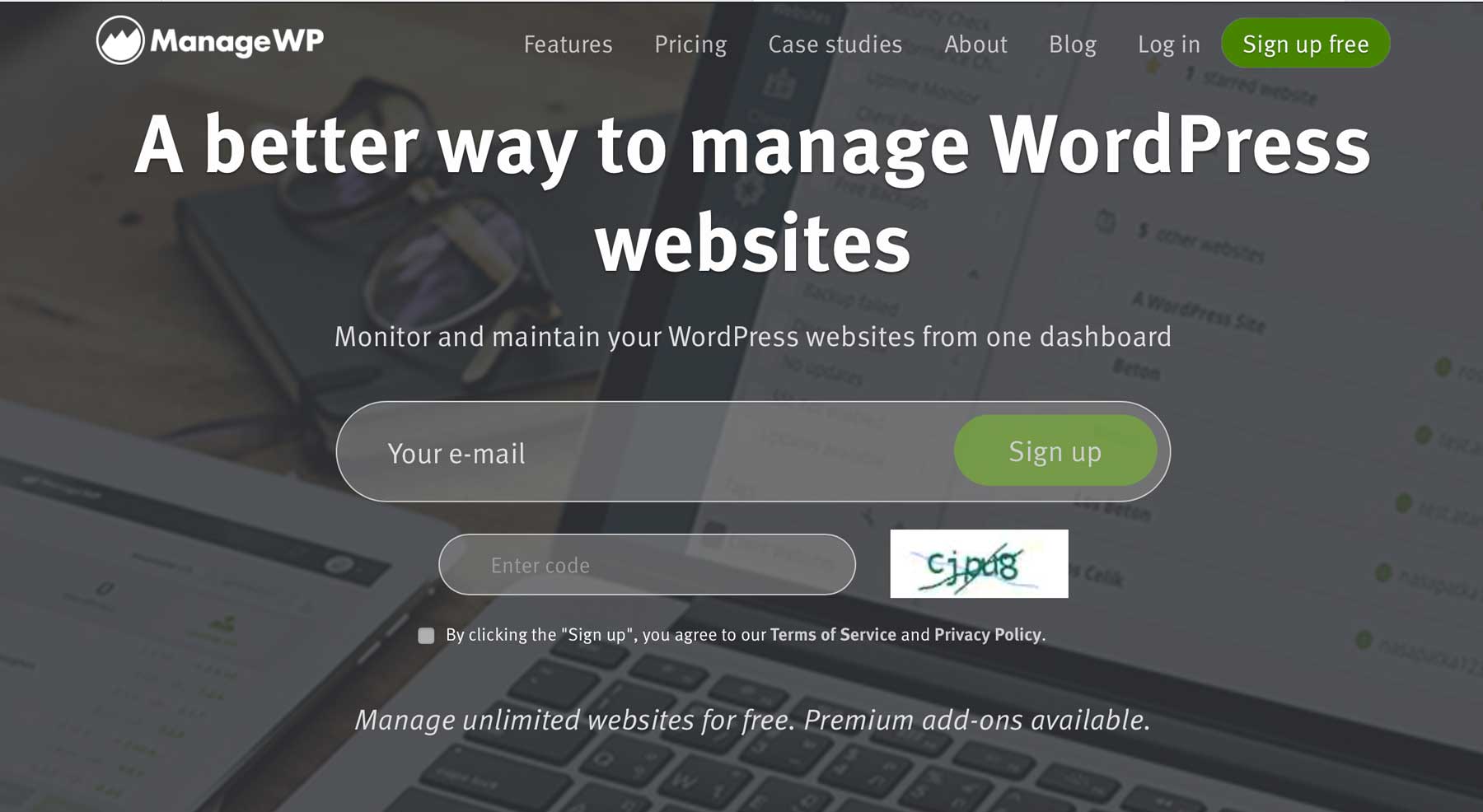
Next up on our list of best WordPress site management tools is ManageWP, and for a good reason. It offers the most free features on our list, making it a top choice for budget-conscious users. With ManageWP’s free version, you’ll get access to many helpful tools, including the ability to add unlimited websites, manage updates for plugins and themes, enjoy a monthly cloud backup, and easily access your admin dashboard with just one click. You’ll also be able to clean up post revisions and spam comments, helping keep your site running smoothly.
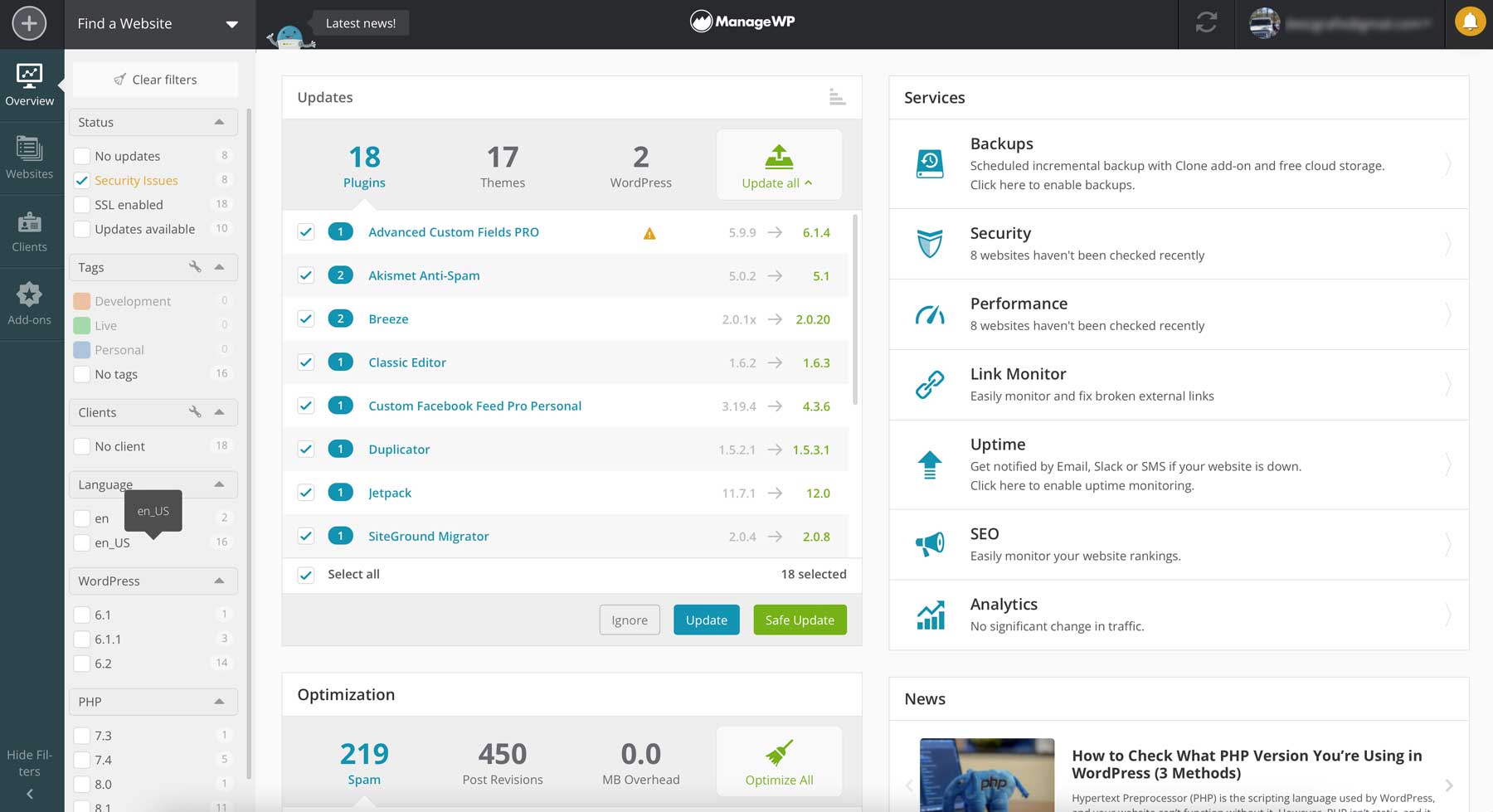
With ManageWP, you can streamline your workflow by adding tags, assigning sites to clients, and using filters to search through them. But that’s not all ManageWP has to offer. It also includes features like maintenance mode, which allows you to update your site without losing visitors. You can also access client reporting and analytics to gauge your site’s performance and run performance checks to ensure your sites are always healthy.
To take things to the next level, you can purchase premium add-ons to access even more features. These include the ability to back up, restore, or clone your websites, perform safe updates, gain valuable SEO insights, monitor uptime and links, and more.
Key Features of ManageWP:
- Manage unlimited websites for free
- One-click admin access
- Team & client collaboration
- Backup, clone, and migrate sites with one click (pro)
- Maintenance mode
Pros
- Comprehensive Features: Depending on your plan, ManageWP offers a wide range of features to streamline WordPress management, including one-click updates, automated backups, uptime monitoring, SEO analysis, white labeling, content management, and detailed client reports. This eliminates the need for multiple plugins or services.
- Add Unlimited Sites: ManageWP offers the ability to add an unlimited number of websites to your account, which is provided for free. All you need to do is sign up with your email, and you can start adding and managing as many websites as you need without any restrictions.
- Modular Approach: All features of ManageWP can be purchased separately for a monthly cost. This can potentially save a lot of money by not opting for features you don’t want to use.
- 1-Click Admin Access: This feature lets you connect all your websites to a single dashboard. From this dashboard, you can get a summary of what’s happening across your websites and log into each with just a single click. This streamlines managing multiple websites, making it much more efficient and convenient.
Cons
- Monthly fees: Unlike some self-hosted options, ManageWP needs a monthly subscription that can become costly over time, even if the cost per site is low. This might not fit everyone’s budget.
- Limited free features: While the free ManageWP plan offers much, you can only access features like uptime monitoring on paid plans. So, upgrading is essential to unlock all the capabilities.
- Uncertain Future: GoDaddy acquired ManageWP a few years ago. Shortly after, they introduced their site management tool, GoDaddy Pro. It’s unclear what will happen with ManageWP, especially since they promote GoDaddy Pro on their site.
🥉 Why We Picked It
ManageWP is our third choice for a website management tool, providing excellent convenience, security, and efficiency. You can benefit from features such as 1-click admin access, the ability to add unlimited sites, safe updates, and strong backups. It makes managing your websites easier, protects your data, and allows you to concentrate on your main business goals.
Who Is ManageWP Best For?
If you’re looking for a free site management tool to manage your websites, ManageWP is an excellent choice. However, there are some caveats. While the basic features are free, you’ll likely need to purchase their all-in-one package if you want all the bells and whistles. Unfortunately, that comes with a hefty price tag. That said, the cost is completely justified, considering you can monitor as many websites as you like.
Community Reviews And Ratings
ManageWP is praised for its ability to manage multiple WordPress sites from a single dashboard, offering features like bulk updates, backups, and performance monitoring, all of which save time and streamline website management.
Pricing
Free, with monthly add-ons starting at $25.
4. GoDaddy Pro
Our following site management tool is GoDaddy Pro, an efficient and free option for anyone seeking to manage multiple websites with ease. GoDaddy Pro’s interface is similar to ManageWP, which offers effortless plugin management, WordPress core updates, post revisions, spam comment control, uptime monitoring, and much more. With GoDaddy Pro, you can add as many websites as you want, regardless of where they are hosted.
The dashboard is easy to navigate, allowing you to manage every site individually or collectively. You can assign sites to different groups, making it easy to manage sites by client or tags. Furthermore, you can perform various tasks such as checking broken links, monitoring individual site performance, approving comments, and making safe updates by creating a backup of your site’s software before updates occur. Additionally, GoDaddy Pro provides client management features but is limited to adding clients with GoDaddy products.
Key Features of GoDaddy Pro:
- Bulk WordPress and plugin updates
- Link monitor
- Automatic backups
- Performance check
- Analytics reporting
- Assign site tags for grouping sites
Pros
- Centralized Management: One significant advantage of GoDaddy Pro is that you can manage several websites, even those not hosted by GoDaddy, with just one login. This lets you oversee all your clients’ sites from a single dashboard, so you won’t need to keep logging in and out of different accounts all the time.
- Time-Saving Tools: GoDaddy Pro provides several tools that help you save time, including bulk updates for plugins, themes, and the WordPress core. These features make maintenance tasks more accessible, letting you update multiple sites simultaneously instead of one by one. This approach saves you a lot of time and effort.
- Client Reporting: Customizable client reports are a crucial feature. They offer insights into site visits, security status, uptime, SEO performance, and more. This helps you keep clients updated and show the value of your services through professional-looking reports.
- Premium Features: You can access premium features such as SEO ranking reports, link monitors, white-label options, and advanced client reporting. These tools give you added flexibility and functionality.
Cons
- Dependency on GoDaddy Services: While the Hub supports sites not hosted by GoDaddy, it is likely optimized for GoDaddy’s own hosting services. This could mean that some features might not work as seamlessly or efficiently with other hosting providers. Likewise, as a non-GoDaddy user, you may have to pay for features which are otherwise free for GoDaddy users.
Who Is GoDaddy Pro Best For?
While GoDaddy Pro is an excellent choice for those on a budget due to its free pricing, it may not be the best option for those seeking comprehensive client management tools, especially if their clients are not exclusively on GoDaddy.
Community Reviews And Ratings
GoDaddy is favored for its user-friendly interface, comprehensive web services including domain registration, website building, and hosting, along with reliable customer support and frequent discounts for new users.
Pricing
Offer free plans, but pricing for premium features isn’t clear.
5. WPMU DEV
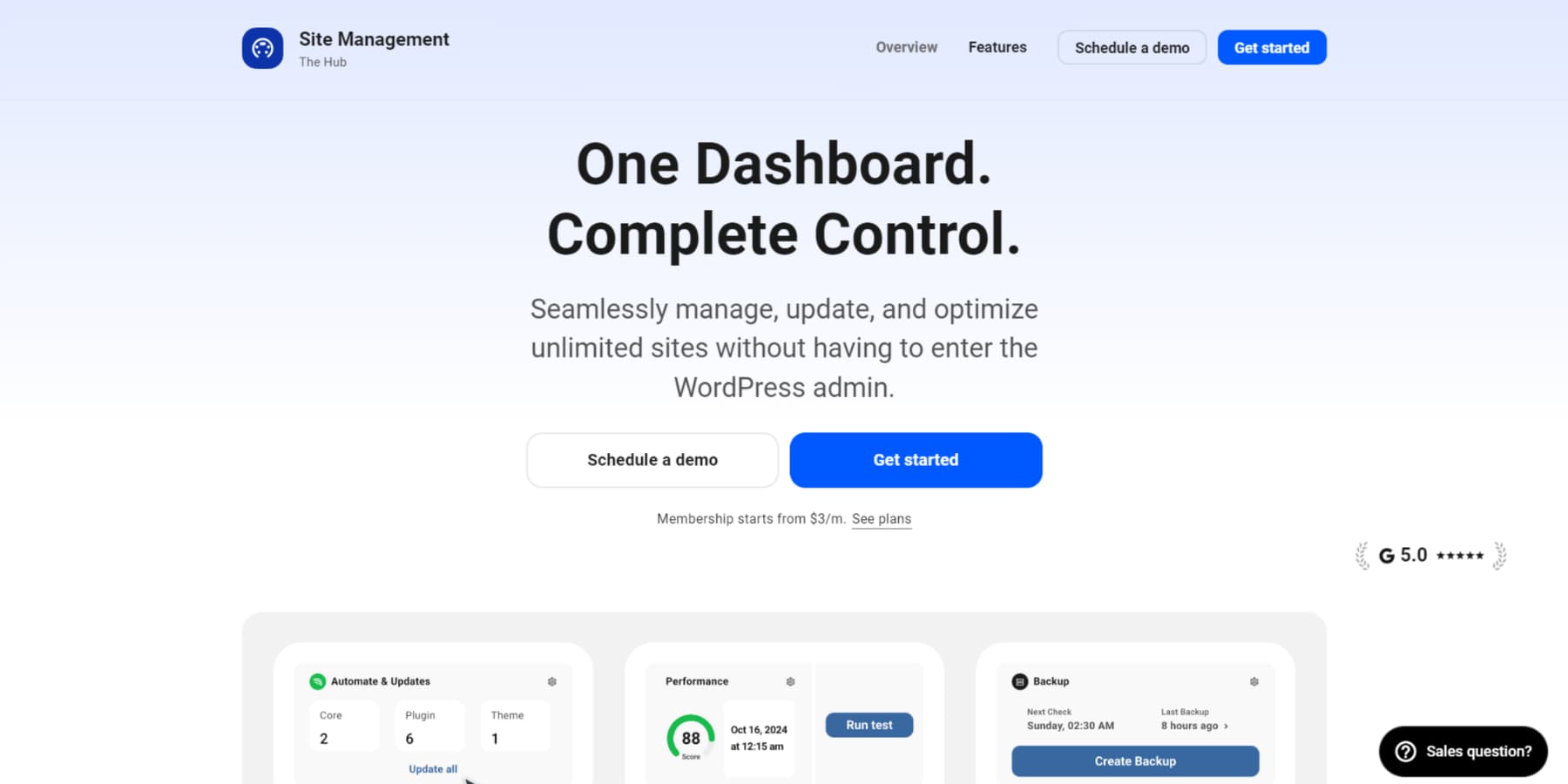
Our next entry, WPMU DEV, offers site management for an unlimited number of WordPress websites. Unlike other platforms on our list, WPMU DEV uses dedicated plugins for all site performance enhancements. These plugins are installed on every site within the dashboard and are designed to help with security, performance, SEO, backups, image optimization, and uptime monitoring.
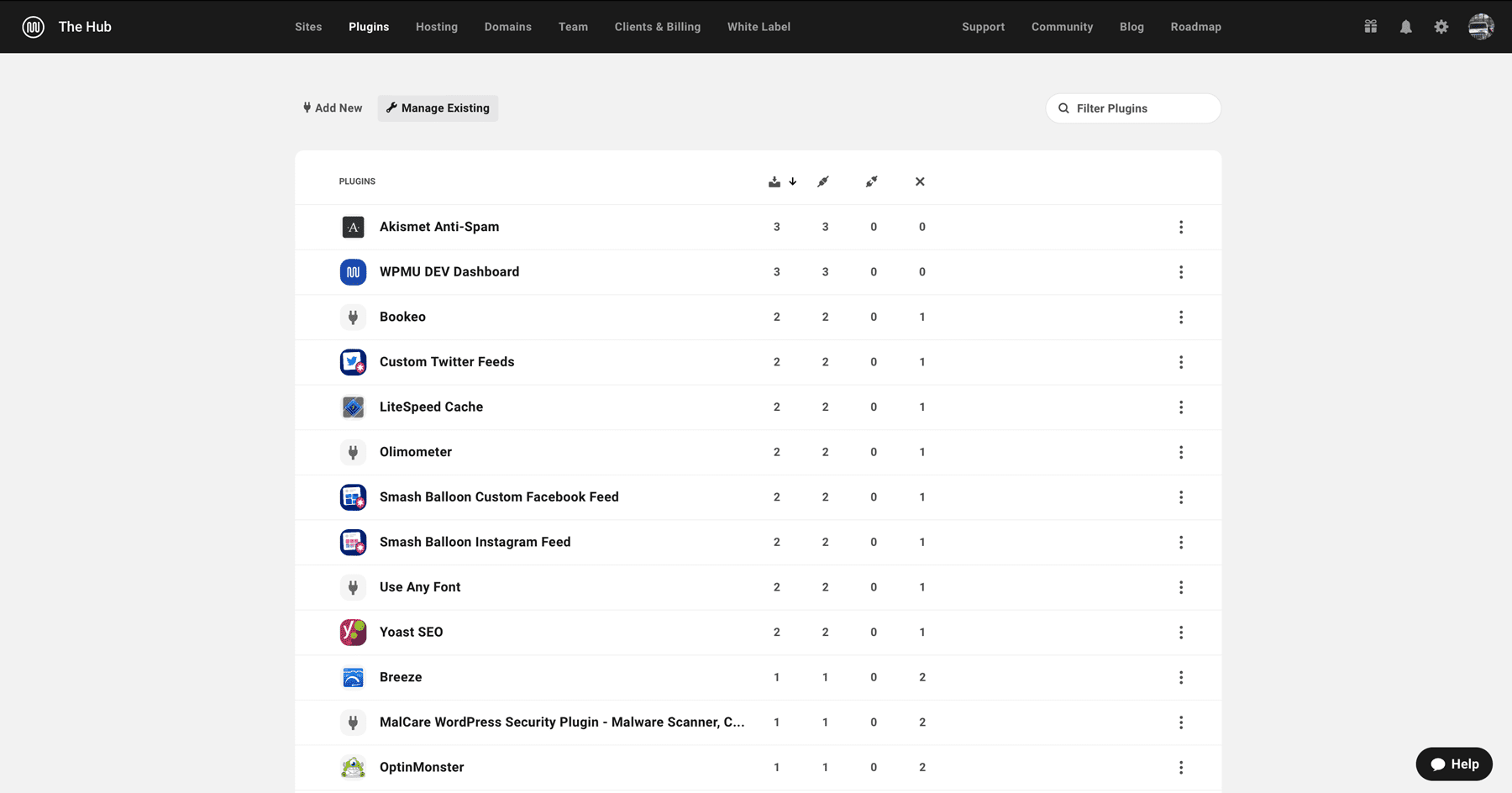
WPMU DEV has several tabs to manage different aspects of your websites. By accessing the plugin tab, you can effortlessly view required updates for individual websites and proceed to update them one by one or collectively. But that’s not all; WPMU DEV goes a step further by providing the option to add team members to aid in site management. This feature is beneficial for those monitoring a significant number of websites. You can reduce your workload and receive much-needed assistance by delegating tasks to team members. Plus, you can enable client billing through an integrated payment system where you can create and send invoices and set up automatic payments, all through a customized white-label payment portal.
Key Features of WPMU DEV:
- Automated updates
- Optimize site performance
- Broken link checker
- Uptime monitor
- Client billing
- Add team members
Pros
- Automated Updates: Automatically updating your plugins, themes, and core software can save you a lot of time and help prevent security issues from the old software. This feature is handy for managing multiple websites, as it ensures they are all current with minimal effort on your part.
- Downtime Alerts: Getting instant alerts for downtime lets you tackle problems immediately. This reduces the effect on your site visitors and keeps your services running. It’s essential for maintaining users’ trust and ensuring their happiness.
- Price: WPMU DEV Hub costs just $3 monthly. This includes access to many of its plugins and features, such as an image compressor and a security plugin.
- Multilingual Support: The Hub is available in 18 languages, making it accessible to you and a global audience. You and other users can interact with the platform in your preferred language.
Cons
- Not standalone: Although the cost is reasonable, the WPMU DEV Hub isn’t available on its own. You’ll need to buy it along with other WPMU DEV plugins and features. This can be inefficient if you’re already paying for similar services.
- Lock-in: Though packed with features, you still need to rely on WPMU DEV plugins to manage your websites, which might tie you into their system.
Who Is WPMU DEV For?
If you want to manage your websites using plugins that enable you to control updates, image optimization, and more, then WPMU DEV can be a good option. However, if you prefer not to overload your website with more plugins, you might want to consider exploring ManageWP or MainWP as viable solutions.
Pricing
Prices start at $3 per month.
6. WP Remote
WP Remote is another excellent site management tool that allows you to control multiple websites with a single click. Built on BlogVault, WP Remote offers features such as plugin, theme, and WordPress core updates, performance enhancements, uptime monitoring, team and client collaboration, and scheduled updates for free.
Upgrading to a paid plan unlocks additional features that will take your website management to the next level. You can easily back up and restore your website and create staging environments with a single click. WP Remote also provides one of the most comprehensive security scans with any site management tool. WP Remote’s powerful firewall immediately blocks any brute force attacks or bad actors while notifying you of vulnerable plugins or themes. And with excellent malware detection, any malware concerns will become a thing of the past, as you can stop threats in their tracks with just one click.
Key Features of WP Remote:
- Activity log (pro)
- One-click backups and restores (pro)
- Daily automatic security scans (pro)
- One-click staging sites (pro)
- Safe updates for WordPress core, themes, and plugins
Pros
- Comprehensive Security Features: WP Remote provides robust security features just for you. These include a malware scanner, a WordPress-specific firewall, and a vulnerability scanner. With these tools, you can quickly find and remove threats, keeping your sites safe.
- Bulk Updates and Staging Sites: You can save time on maintenance by safely updating multiple plugins and themes at once. Creating staging sites for testing updates allows you to spot and fix potential issues before they affect your live site, ensuring stability.
- Performance Monitoring: WP Remote’s performance monitoring tools track your page load times and uptime. With these insights into your site’s performance, you can quickly identify and resolve any issues, ensuring your users always have a smooth experience.
- Customizable Reporting: When managing client websites, you can benefit from generating customizable reports. By tailoring these reports to include specific data points, you can inform your clients about their sites’ status and performance.
Cons
- Limited Free Version: The free version of WP Remote has limited features. You may need to upgrade to a paid plan to access essential tools like comprehensive security and detailed performance monitoring.
- Cost: While WP Remote offers a free version, you need to pay for many of its advanced features. This cost might be too high for smaller businesses or individuals managing just a few sites. The extra fees for add-ons like real-time backups or extra staging sites can quickly add up.
Who Is WP Remote Best For?
If you’re seeking an effective solution to tackle security threats across multiple websites, look no further than WP Remote. This powerful tool offers a comprehensive suite of security features, including malware detection and removal and brute force attack prevention, ensuring your websites are safe and secure. The cost is reasonable, with premium plans starting at just $29 monthly for a 5-site license.
Community Reviews And Ratings
People appreciate WP Remote for its ability to manage multiple WordPress sites from a single dashboard, offering features like backups, security, and updates, which save time and enhance website management efficiency.
Pricing
WP Remote’s pricing starts at $29 per month.
7. CMS Commander
CMS Commander stands out as a site management tool with its user-friendly interface. Users can effortlessly manage updates, add and control WordPress user accounts, and even perform automatic backups and restorations with just one click, all within a simplified dashboard. But that’s not all; CMS Commander has gone above and beyond by providing additional features that surpass most other site management tools on our list. These features include bulk installation of plugins, the ability to copy site settings and apply them to other sites, bulk post-editing, content import, and much more.
Although CMS Commander’s user interface may not be the most visually appealing, its functionality is unmatched. It is designed to provide a seamless experience, allowing you to manage every aspect of your websites effortlessly. The intuitive layout, complete with well-designed tabs and icons, makes identifying and navigating the features you need easy. You can quickly determine which of your sites require updates, view critical analytics, clean up comments, access post drafts and revisions, and utilize other essential tools, such as security features, all in one place.
Key Features of CMS Commander:
- One-click updates
- Bulk posting
- Bulk plugin installation
- Copy settings from one site to another
- Manager user accounts
- Automatic backup & restore
- Easily deploy new WordPress sites
Pros
- Bulk Updates: One key feature of CMS Commander is the ability to update multiple websites at once. This saves you a lot of time, especially if you manage many sites for your business or agency.
- Content Management in Bulk: With CMS Commander, you can easily edit, schedule, and manage content across all your sites in bulk.
- Site Cloning: The tool helps you easily clone sites, including all settings, plugins, themes, and content.
Cons
- Inadequate Backup Solutions: While you can schedule backups, they are not automatically stored offsite. You must manually set up offsite storage options like email or Dropbox.
- Limited Reporting Features: The reporting feature doesn’t work well. It often fails to log important activities like backups or security scans.
- Outdated: The WordPress plugin repository shows that the CMS Commander plugin hasn’t been updated in over a year. This could mean the project is abandoned.
Who Is CMS Commander Best For?
CMS Commander is a great choice if you’re looking for advanced features beyond traditional site management tools. With an intuitive dashboard and all tools accessible on a single screen, you’ll have easy access to everything you need. Their starter plan is affordable, offering ten websites for just $8 monthly. However, if you have hundreds of sites, CMS Commander offers higher-tiered plans to accommodate your needs.
Community Reviews And Ratings
People like CMS Commander for its centralized management, bulk content updates, user-friendly interface, backup and restore functionality, and the ability to manage multiple WordPress sites efficiently from a single control panel.
Pricing
Free 14-day trial, after which pricing starts at $8 per month.
8. InfiniteWP
Our next recommended WordPress site management tool is InfiniteWP, which stands out from the other entries on our list by not offering a free tier. Despite this, it’s still worth considering due to the range of impressive features it provides. In addition to the standard site management tools like updates, malware scanning, and one-click admin access, InfiniteWP offers much more. You can install, manage, and migrate WordPress, monitor your site’s uptime, and back up and restore sites with just one click. Moreover, it offers extensive client reporting tools that you can use to keep your clients informed about their site’s performance.
To manage multiple websites with InfiniteWP, you must first create a blank WordPress install for the admin panel to be housed. It works as the hub to monitor all of your websites. Additionally, you must install the IWP Client plugin on each site you’d like to monitor. While this does take a bit of time to accomplish (especially if you have a ton of sites), once set up, you’ll save a lot of time moving forward. In our experience, using the Chrome browser to install the software is best, as Safari was quite buggy.
Key Features of InfiniteWP:
- One-click site access
- Backup & restore
- Install, migrate, and stage WordPress
- Uptime monitor
- Malware scanning
Pros
- Automatic Backups: InfiniteWP lets you automatically back up your website offsite. This means your data is regularly saved and protected from potential loss. With this feature, you can relax, knowing you have a safety net if something goes wrong.
- Monitoring Tools: The platform provides tools for monitoring your site’s uptime, optimizing performance, and analyzing data. These tools help ensure your website runs smoothly and quickly address any issues.
- Maintenance Tasks: You can perform regular maintenance operations in bulk, which keeps your websites clean and updated. This feature makes routine tasks less tedious and more manageable.
Cons
- Limited Free Version: You might find that the basic features of the free version don’t meet all your needs, which could lead you to consider the premium plans for full functionality.
- User Interface: The interface might not be as intuitive or user-friendly as some competitors. This can make navigation and finding specific features more cumbersome, especially for non-technical users.
Who Is InfiniteWP Best For?
With InfititeWP, you can sign up for free, but you’ll have to sign up for a premium account to take advantage of its services. You can monitor up to 10 sites on the starter plan for $147 annually, making it a better fit for those with only a few sites to manage. Also, due to its glitchiness on Safari, if you’re a Mac user who prefers using its native browser, you might want to consider another option, such as MainWP.
Community Reviews And Ratings
People appreciate InfiniteWP for its user-friendly interface, centralized management of multiple WordPress sites, reliable backup features, and the convenience of a single login for all sites.
Pricing
Free version available. Paid plans start at $147 per year.
9. WP Umbrella
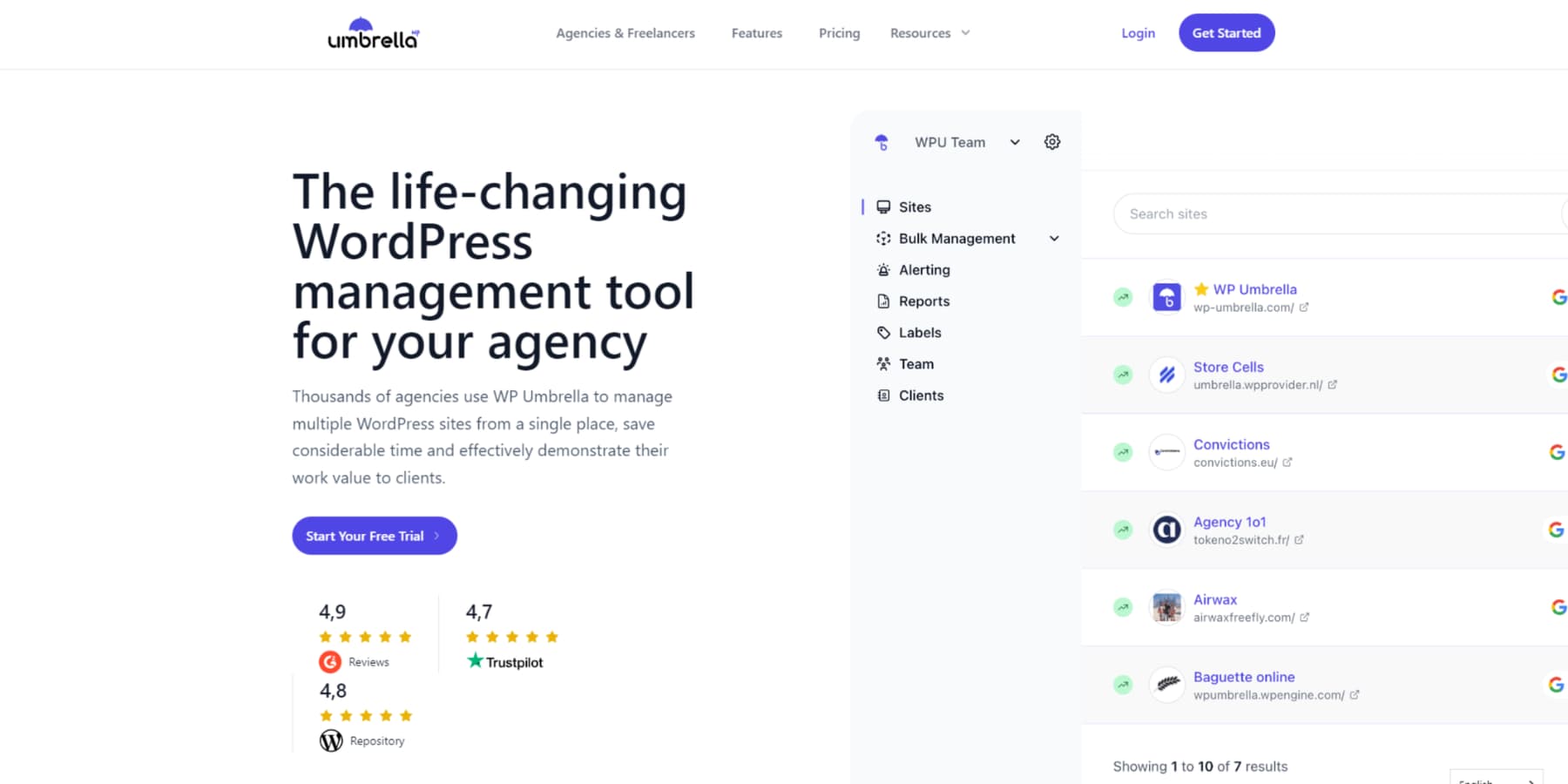
WP Umbrella, our next entry on the list, offers a different approach to how you pay for its services. Its modular pricing approach allows you to pay per site instead of a fixed price for a certain number of sites. It offers a user-friendly interface that provides uptime and performance analytics, displays PHP errors, facilitates updating WordPress core, themes, and plugins, allows for scheduled backups, and even lets you create maintenance report templates for sharing site health information with clients.
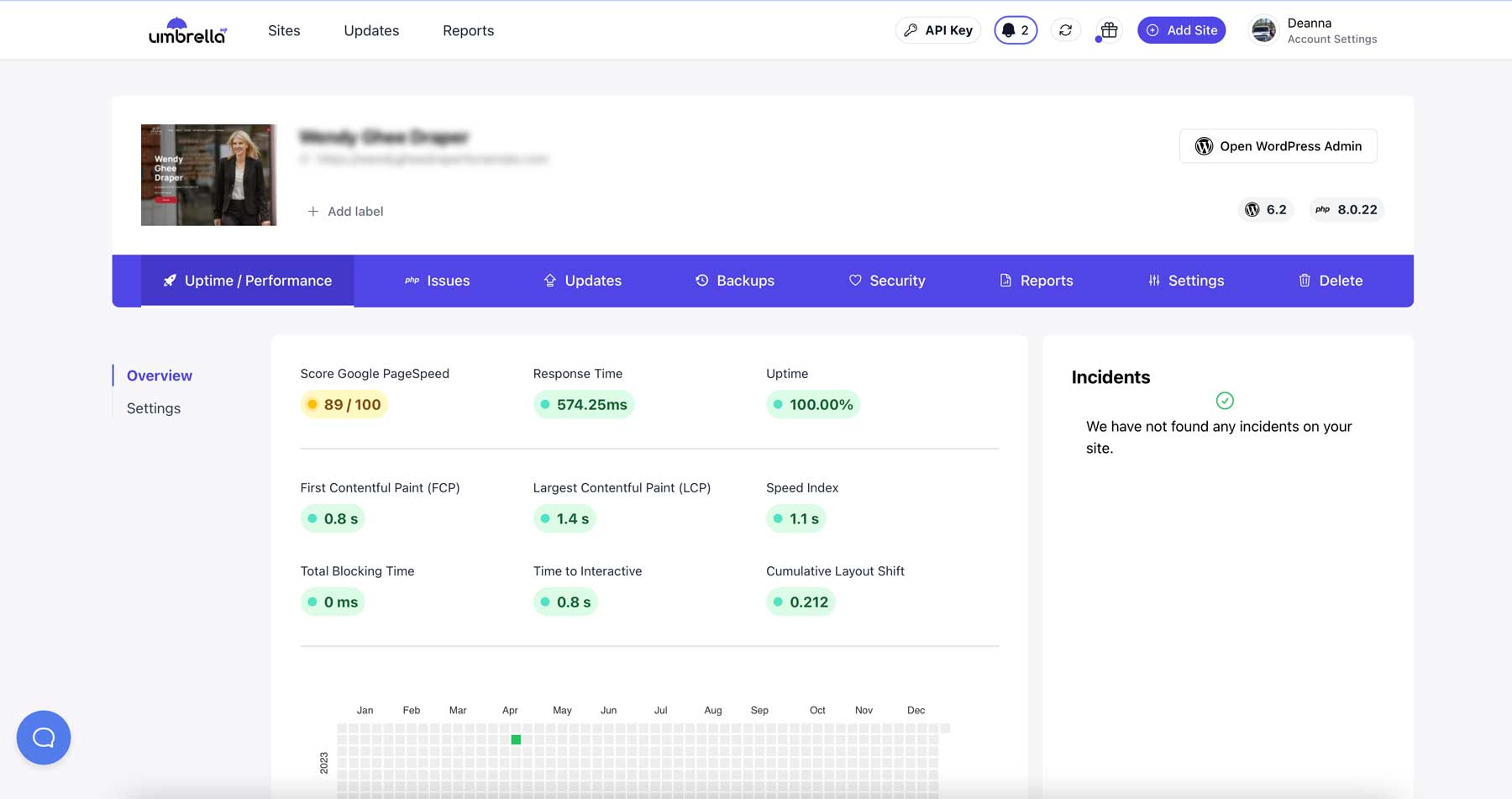
The uptime and performance tab allows you to view various analytics about your site’s Google PageSpeed test results, along with metrics for response time, uptime, and core web vitals, such as first contentful paint (FCP), speed index, total blocking time, and more. WP Umbrella offers a 14-day free trial without needing a credit card when signing up. This allows for plenty of time to test out the platform. One downside to WP Umbrella is the lack of comment, spam, and post-revision optimization offered by rival platforms. However, the ability to create custom site health report templates is a nice feature to offset this, which is great for keeping your clients informed about their site’s status.
Key Features of WP Umbrella:
- White label feature
- Uptime and performance monitoring
- Schedule maintenance reports
- Bulk WordPress core, theme, and plugin updates
- Automated backups
Pros
- Performance Monitoring: WP Umbrella offers tools for monitoring page load times, server response times, and overall uptime. This is crucial for ensuring a great user experience and maintaining good SEO rankings.
- Automated Backups: WP Umbrella ensures your client websites’ safety by offering automated backups stored in the cloud on European servers. This guarantees GDPR compliance, significantly reducing the chance of data loss.
- White Label: The white-label option lets you remove WP Umbrella’s branding, helping you impress clients and maintain a professional appearance.
- Clean Dashboard: The dashboard is simple and user-friendly, displaying key details such as page speed, updates needed, backup status, and quick links to the admin panel. This setup simplifies managing and overseeing multiple sites.
Cons
- Security: WP Umbrella offers no malware scanner, firewall, or brute force protection. This makes your site vulnerable to various attacks and compromises your overall security.
- Price: WP Umbrella charges per website. This can be good for a smaller agency. However, managing many websites might cost too much. In that case, you might prefer other services that offer unlimited websites for a fixed price.
Who Is WP Umbrella Best For?
Those with a handful of websites will appreciate WP Umbrella’s pricing structure, which charges per site rather than an inflated price like other tools on the list. Plus, if you like the idea of creating custom client reports to reflect your branding, WP Umbrella is a must.
Community Reviews And Ratings
People appreciate WP Umbrella for its ease of use, comprehensive features, responsive support, and consistent updates, making WordPress site management efficient and hassle-free.
Pricing
$1.99 per site per month.
10. Solid Central
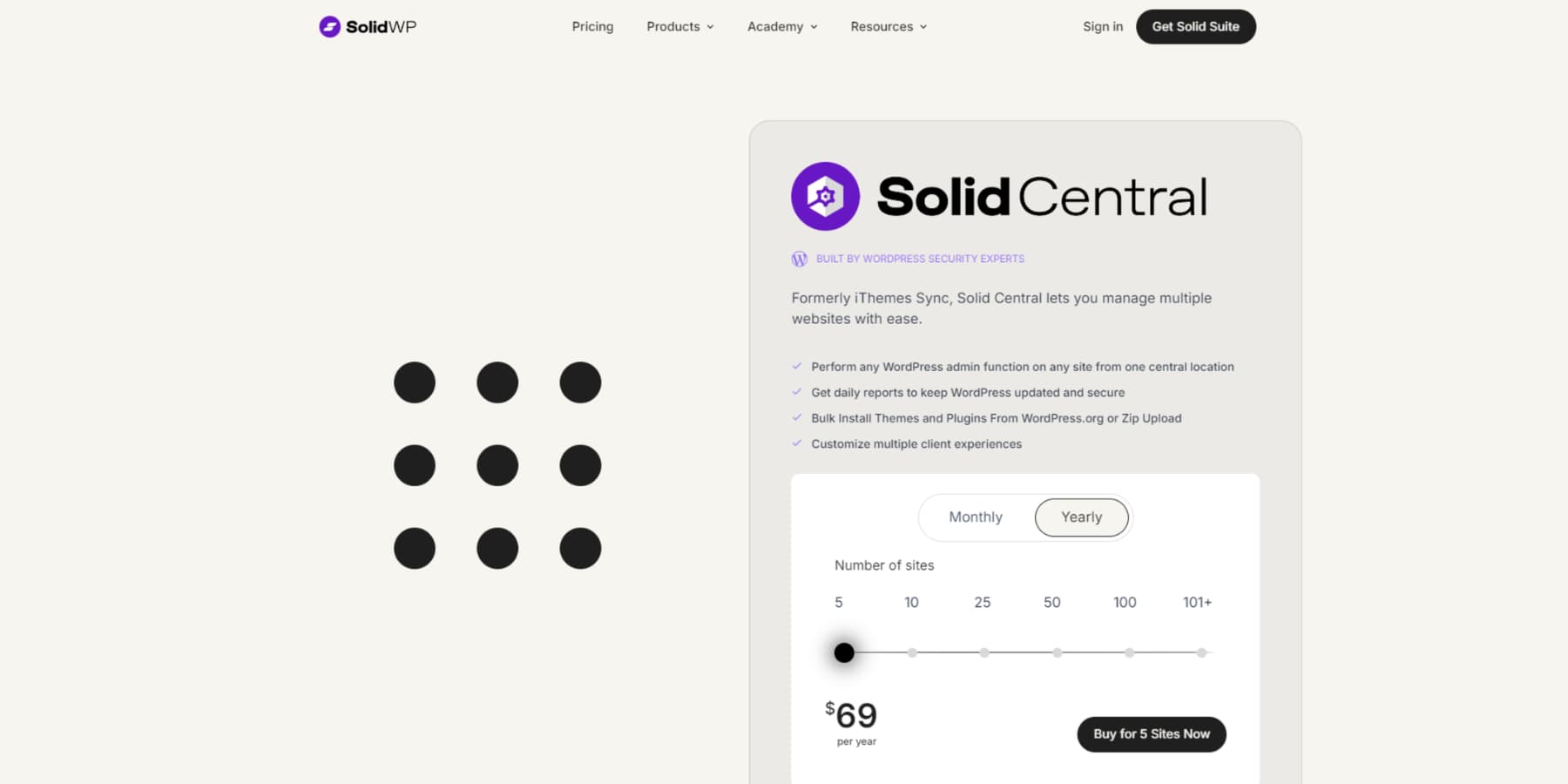
Closing out our list of best WordPress site management tools is Solid Central, previously known as iThemes Sync. This comprehensive tool offers a variety of features for managing multiple websites, including one-click updates for WordPress core, plugins, and themes, uptime and performance monitoring, and the ability to create backups remotely through its Solid Backups integration.
With Solid Central, you can also benefit from robust security options thanks to its integration with Solid Security. Additionally, the tool comes equipped with an SEO checker that seamlessly integrates with Yoast SEO, giving you real-time feedback on your SEO scores and readability.
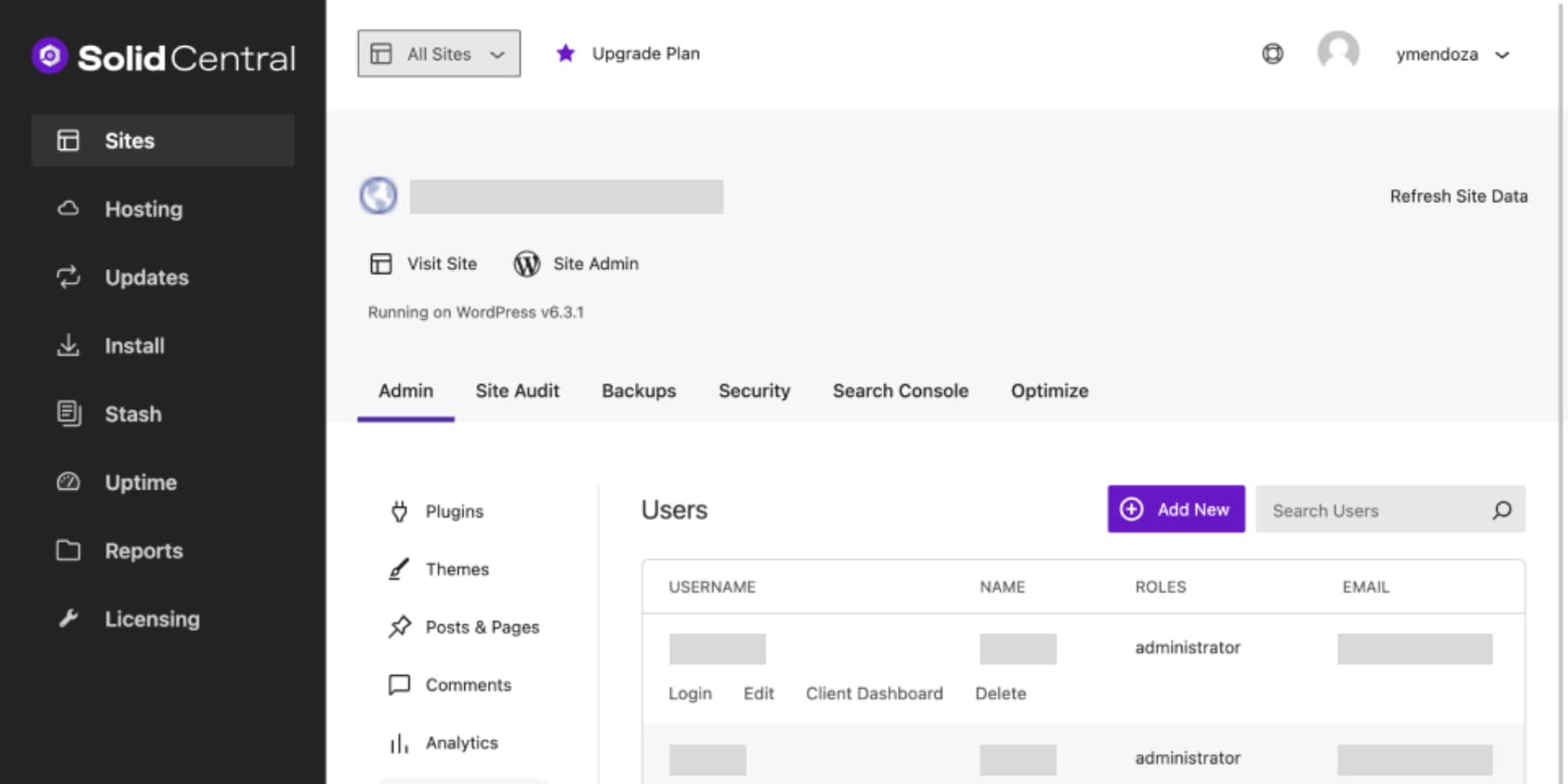
Solid Central’s dashboard is a breeze to navigate. It offers several tabs that help you manage your sites effortlessly, such as updating plugins and themes, viewing site performance, and creating reports that can be automatically generated and sent to your clients. Furthermore, it includes a Stash tab that allows you to store all your site backups in one convenient location.
However, what truly sets Solid Central apart is its ability to create custom, user-friendly WordPress dashboards for your clients. With this feature, you can handpick which menu items and widgets your clients can see while hiding unnecessary and distracting admin notices. The Client Dashboard feature lets you control how your clients interact with their WordPress sites, providing a streamlined and less confusing interface.
Key Features of Solid Central:
- One-click WordPress updates
- Custom client dashboards
- Remote WordPress backups
- Theme and plugin manager
- Yoast SEO integration
- Uptime monitoring
Pros
- Remote Administration: You can handle WordPress admin tasks from anywhere, such as backups, restores, and security checks. This feature is convenient for administrators managing sites in various locations.
- Uptime Monitoring: The platform monitors your site’s uptime and provides detailed reports. You will receive alerts if your site goes offline and can check its performance history.
- Customization: You can also benefit from customizing different client experiences from one spot. This lets you offer personalized solutions that match each client’s specific needs.
Cons
- Scalability Limitations: Solid Central supports managing up to 100 sites, which could be limited for businesses with a larger number of sites. If you have over 100, you may consider contacting them directly for a custom quote.
- Solid Ecosystem: For maintenance-related tasks like security and backups, you’ll need to use other products in the Solid suite, such as Solid Security and Solid Backups. These come at an additional cost, but you can save money by choosing the Solid Suite package. If you decide to switch services later, you must find alternatives for all these functions.
Who Is Solid Central Best For?
Solid Central is worth trying out for those interested in creating custom WordPress dashboards or starting a WordPress maintenance business. Although it may not be the most budget-friendly option, it offers exceptional tools for managing clients that can help justify the cost.
Community Reviews and Ratings
SolidWP enjoys a positive reputation on platforms such as G2 for being both user-friendly and providing excellent support.
Pricing
$69 per year for five sites.
What Are the Best WordPress Site Management Tools?
Among the site management tools highlighted in this post, Divi Dash, MainWP, and ManageWP truly stand out due to their exceptional free features, which include seamless WordPress core, plugin, and theme updates, instant WordPress access with just a single click, and flexibility to add unlimited WordPress sites.
Divi Dash is a simple, free, and quick solution for all Divi users. MainWP is an ideal choice for those seeking a self-hosted solution. In contrast, ManageWP runs on cloud-based servers, eliminating the need for a separate WordPress installation for the dashboard.
| Plugin | Starting Price | Free Option | ||
|---|---|---|---|---|
| 🥇 | Divi Dash | Free For Divi Users | ✔️ | Visit |
| 🥈 | MainWP | $16.5/month | ✔️ | Visit |
| 🥉 | ManageWP | $25/month | ✔️ | Visit |
| 4 | GoDaddy Pro | Free | ✔️ | Visit |
| 5 | WPMU DEV | $3/month | ✔️ | Visit |
| 6 | WP Remote | $29/month | ✔️ | Visit |
| 7 | CMS Commander | $8/month | ❌ | Visit |
| 8 | InfiniteWP | $12.25/month | ❌ | Visit |
| 9 | WP Umbrella | $1.99/site/month | ❌ | Visit |
| 10 | Solid Central | $5.75/month/5 sites | ❌ | Visit |
Ultimately, the ideal WordPress site management tool for you will depend on your preferences. However, since both Divi Dash and MainWP offer free basic features, we strongly recommend trying both to determine which best suits your needs.
Need more tools for WordPress? You can find more articles on our blog featuring the best website tools and the best plugins for WordPress.
Frequently Asked Questions (FAQs)
Before we wrap up, let’s answer some of your most common questions regarding the best WordPress website management tools. Did we miss one? Leave a question below, and we will respond!



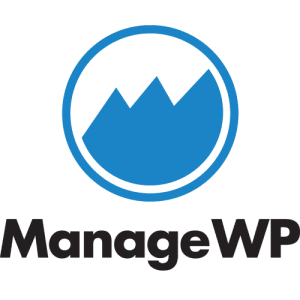
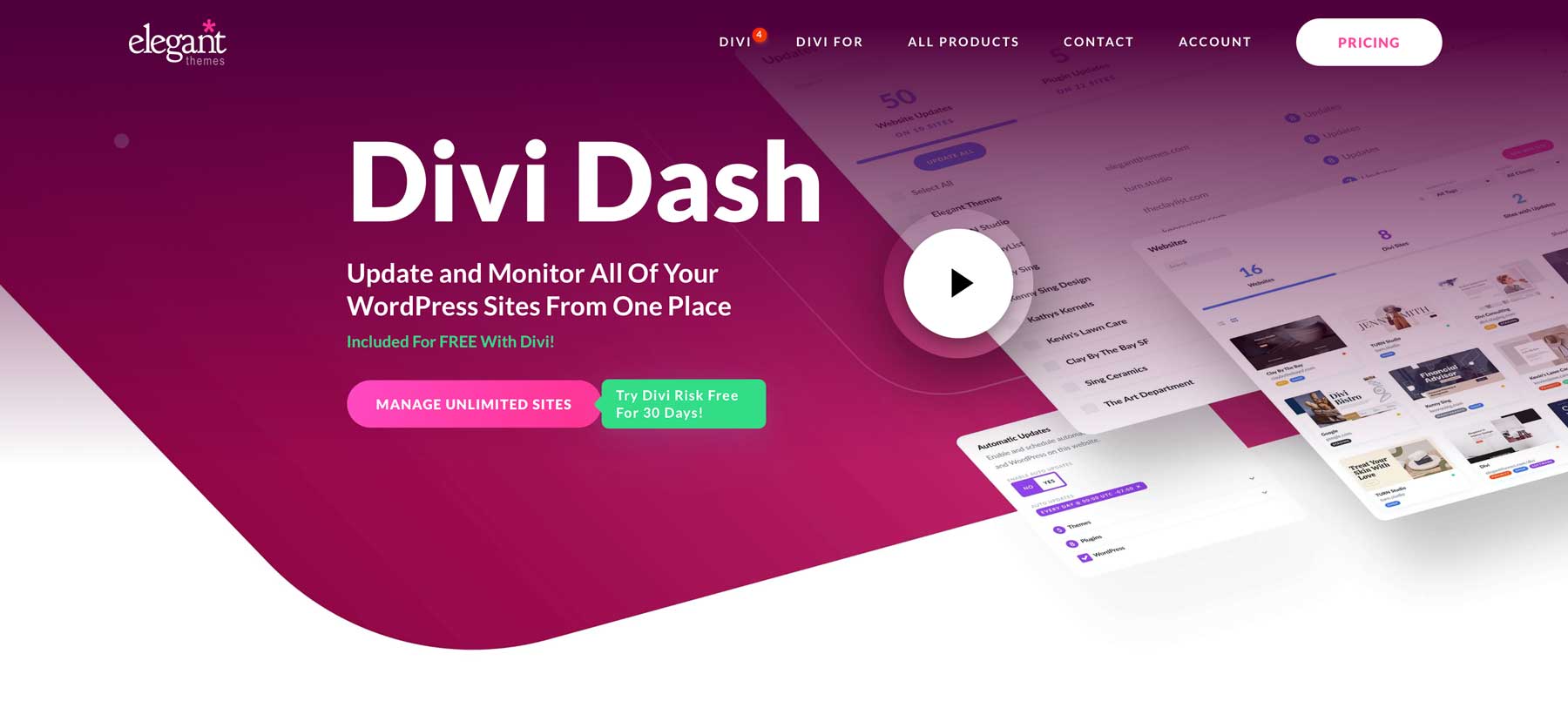
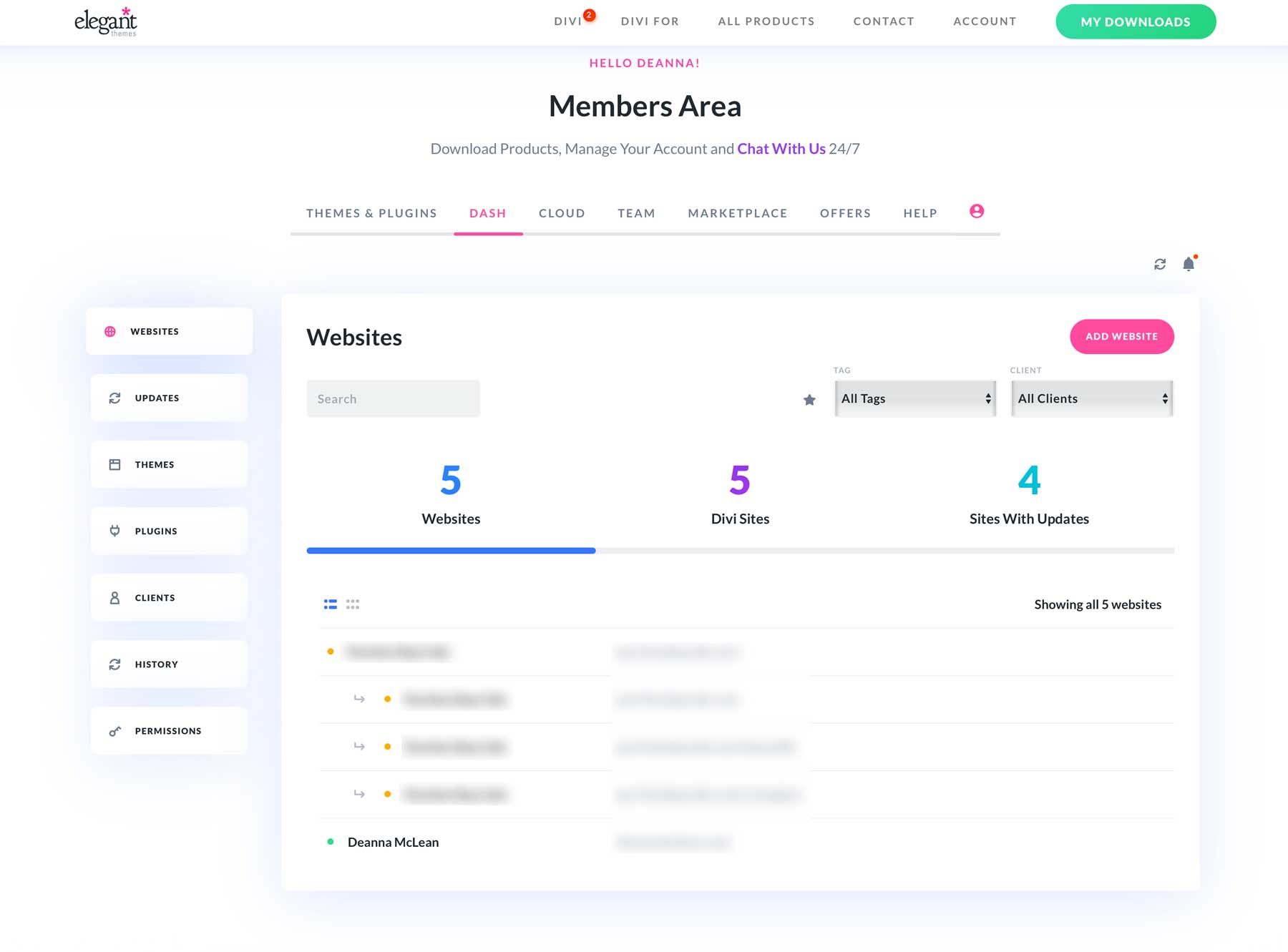





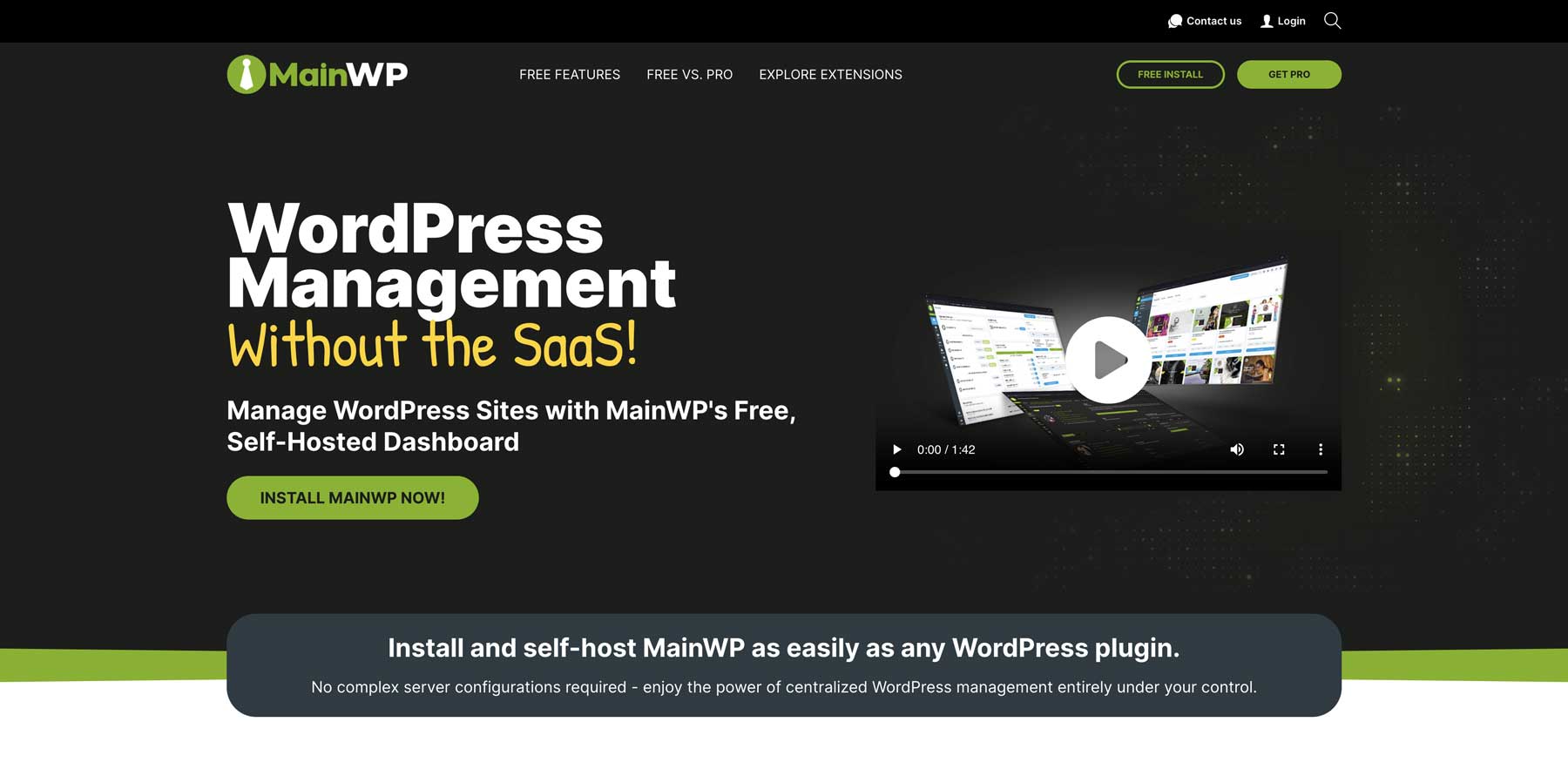
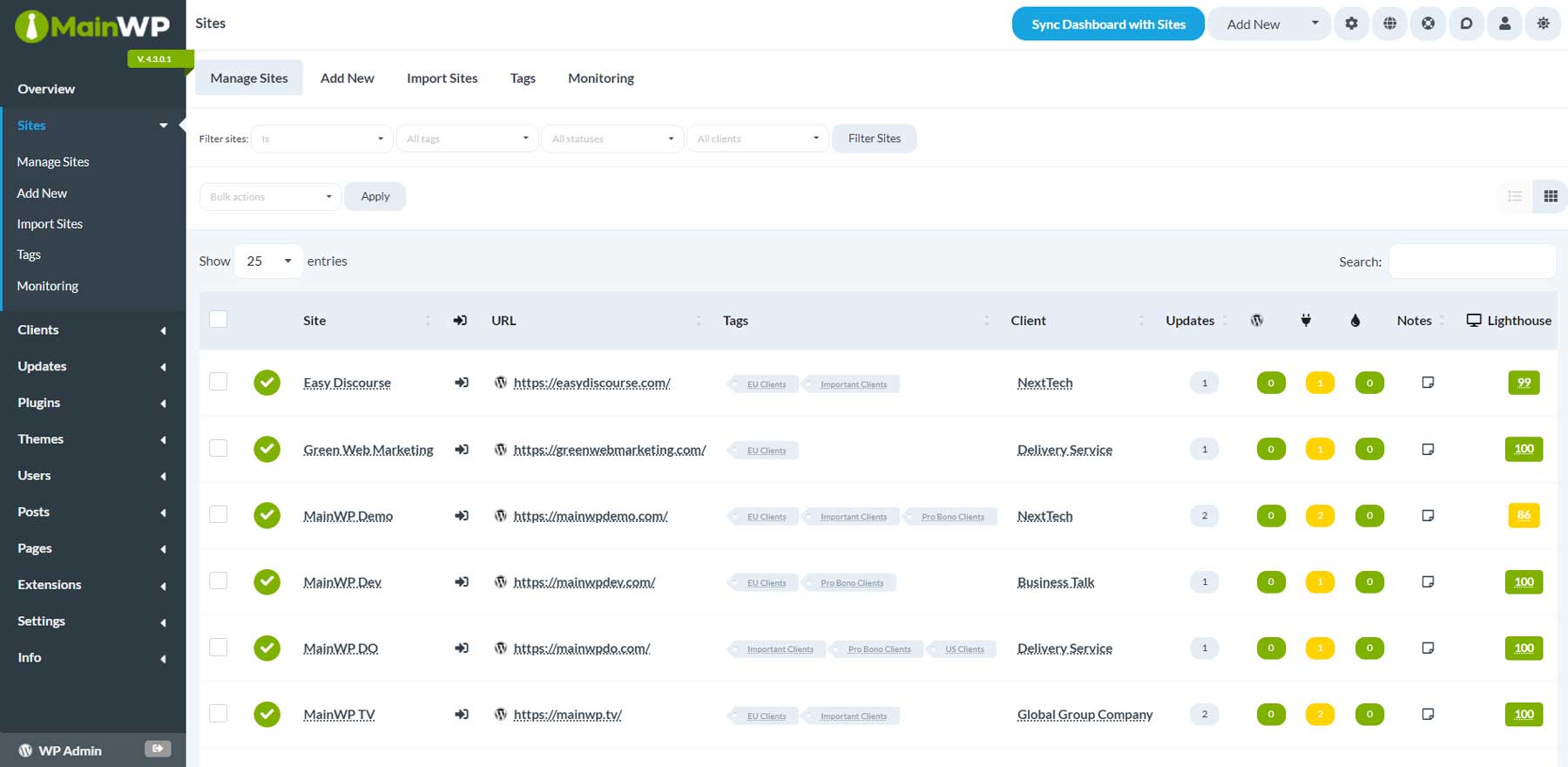

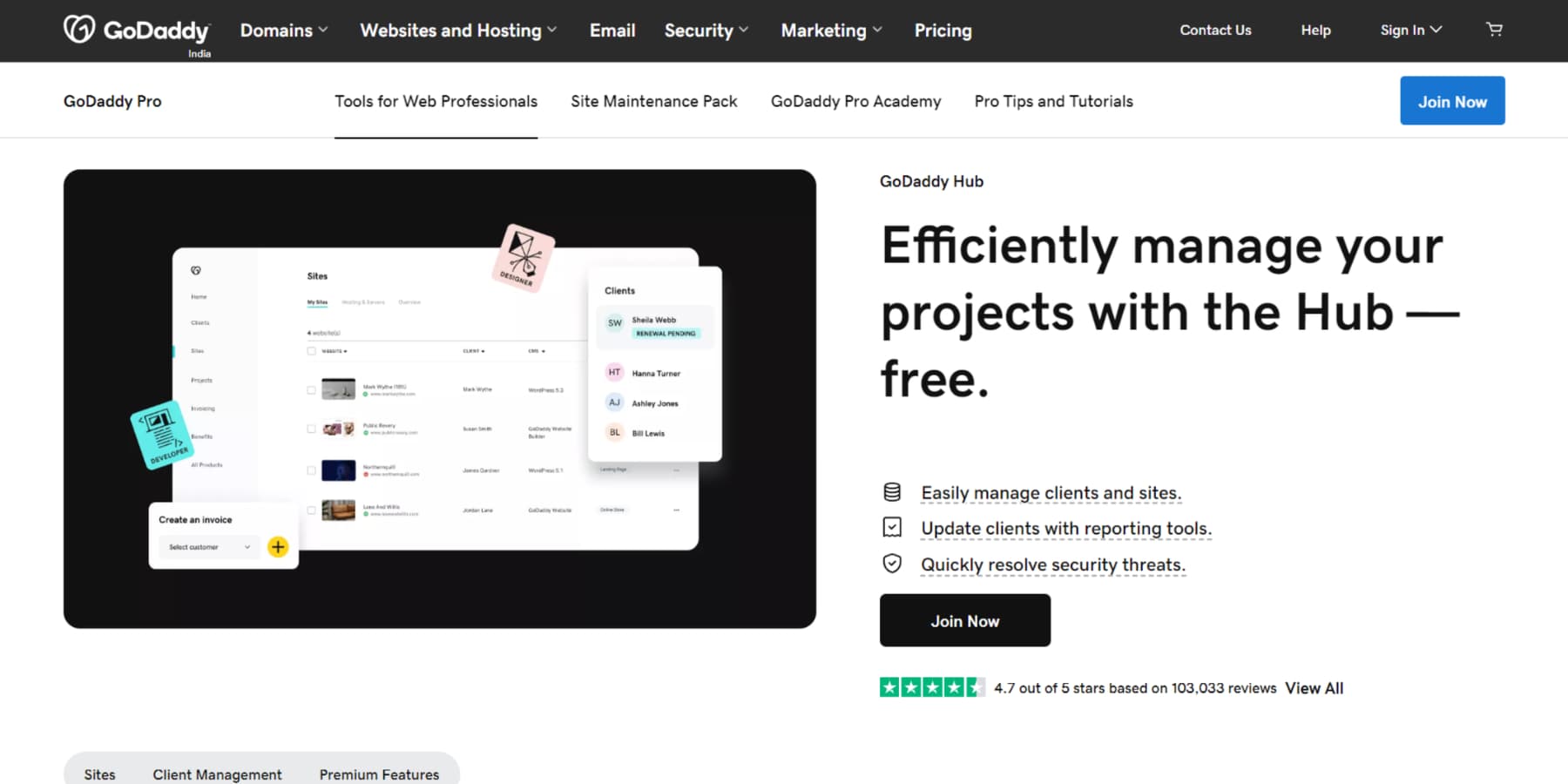
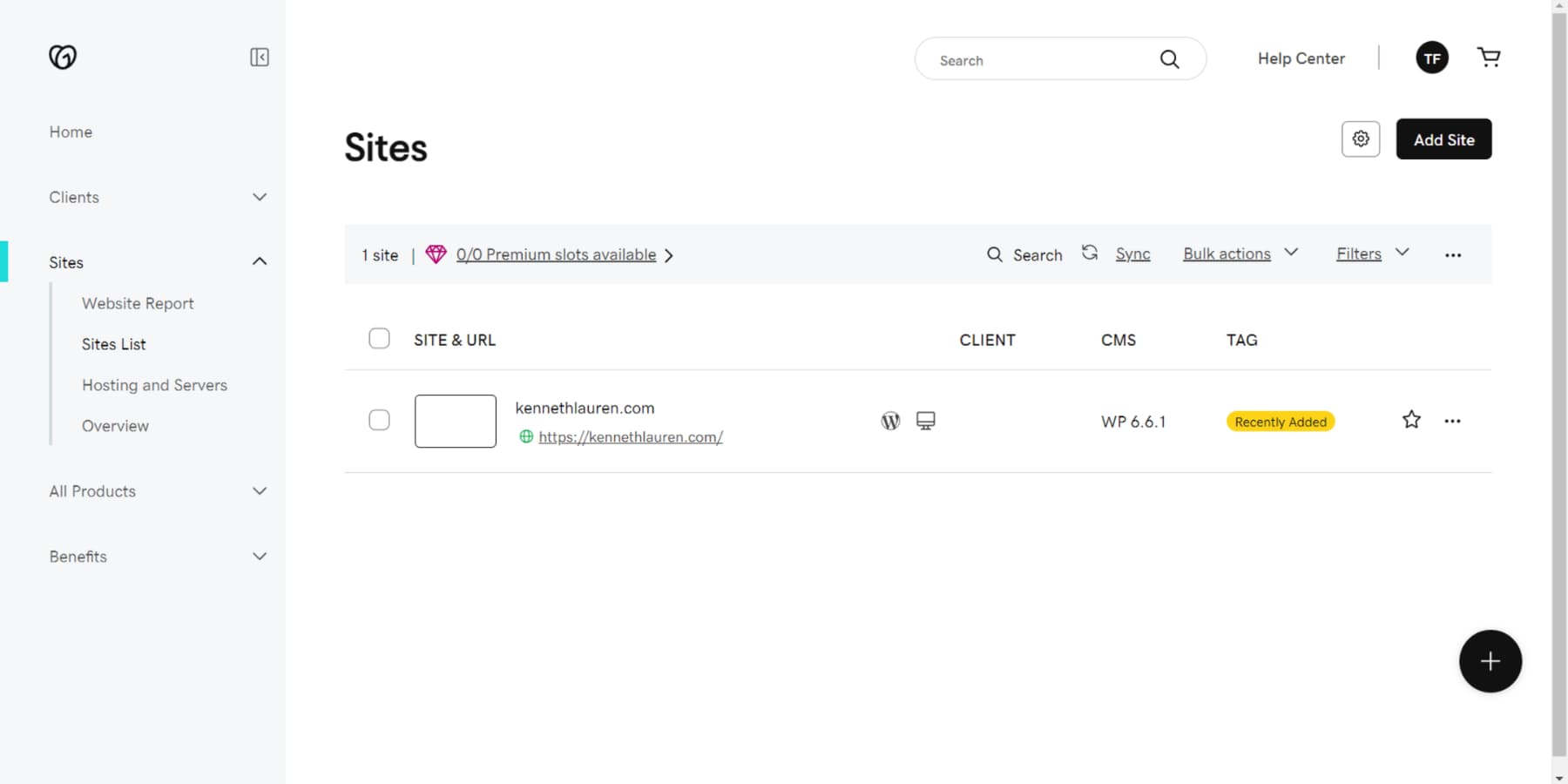

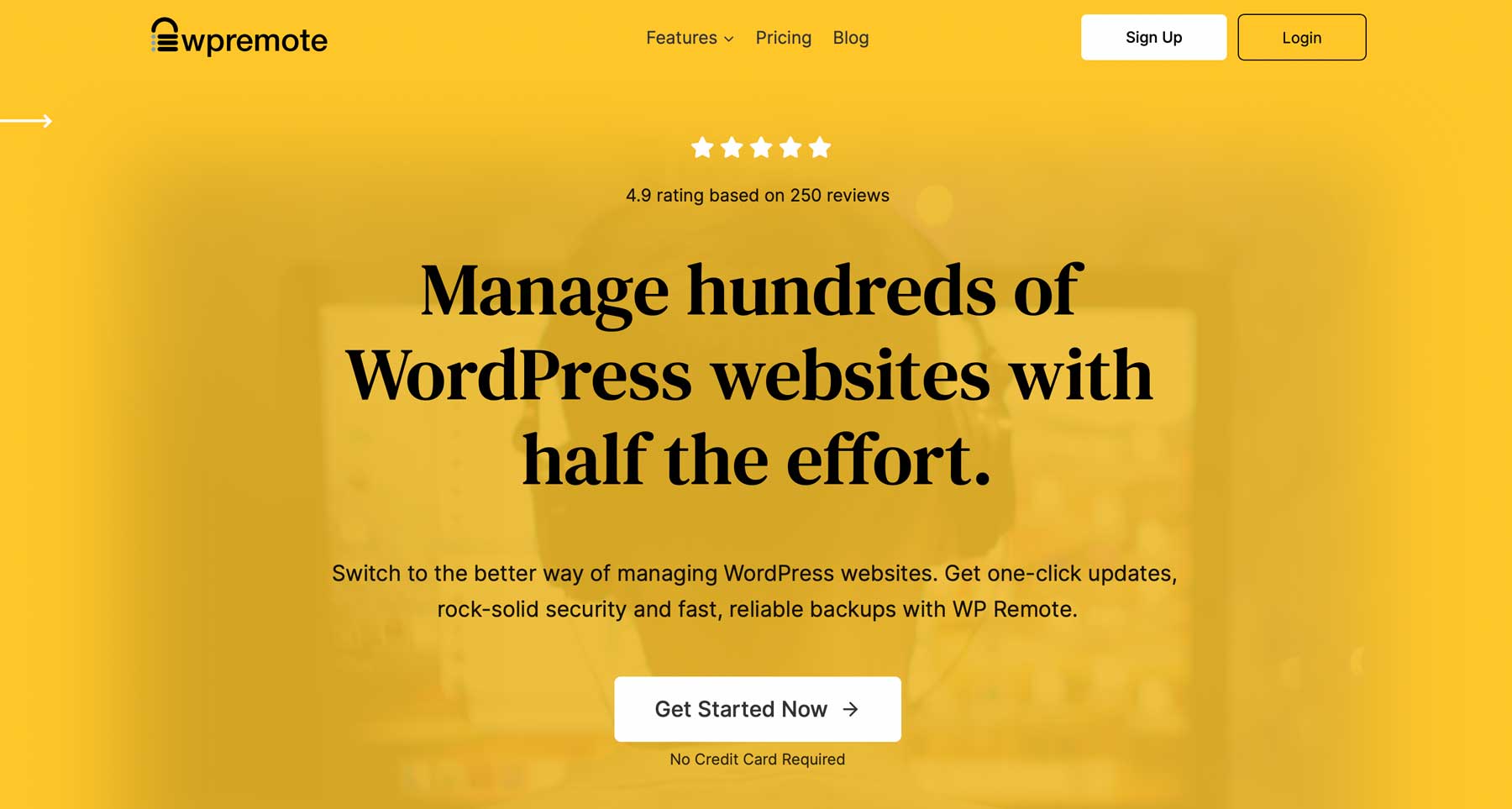
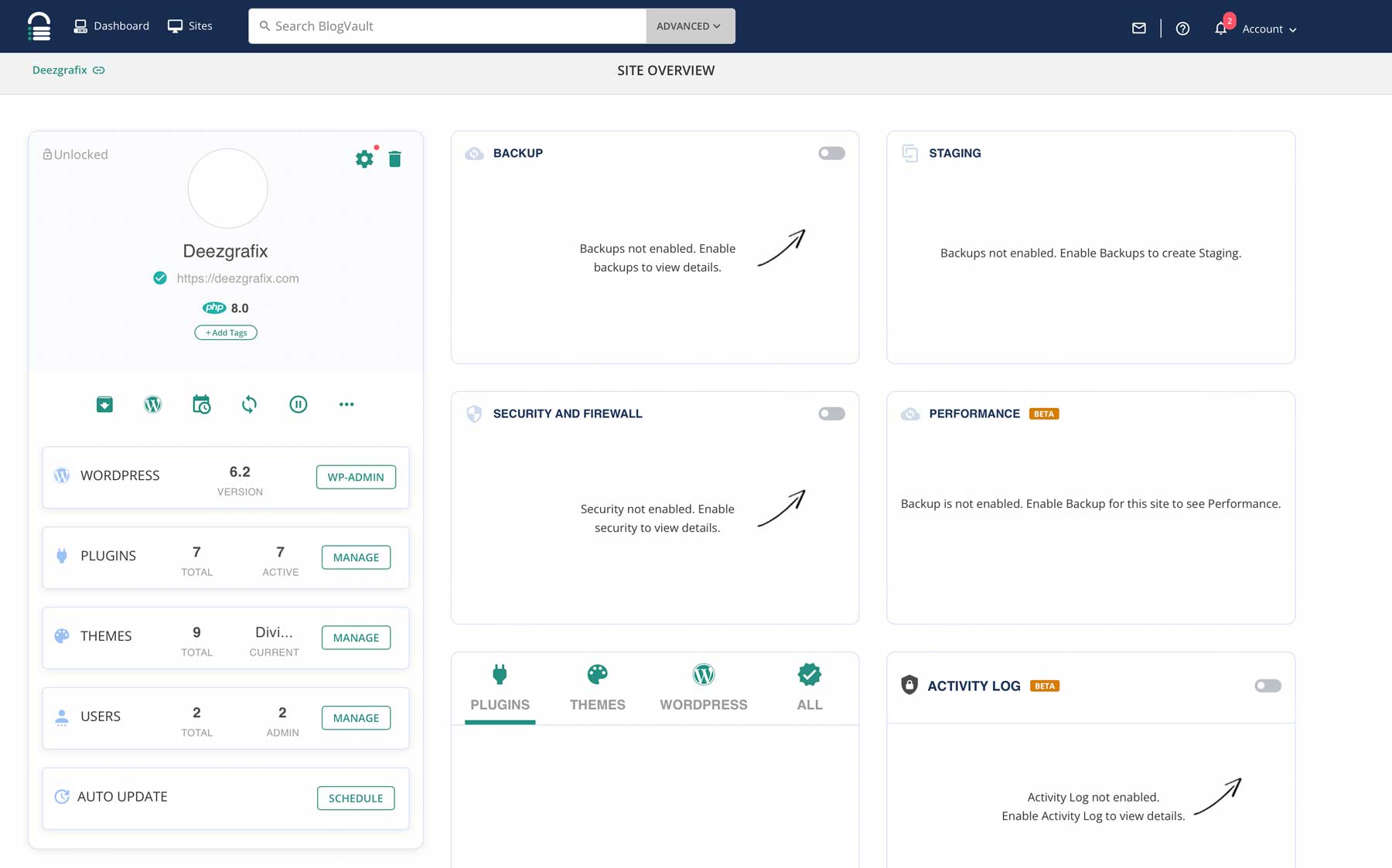
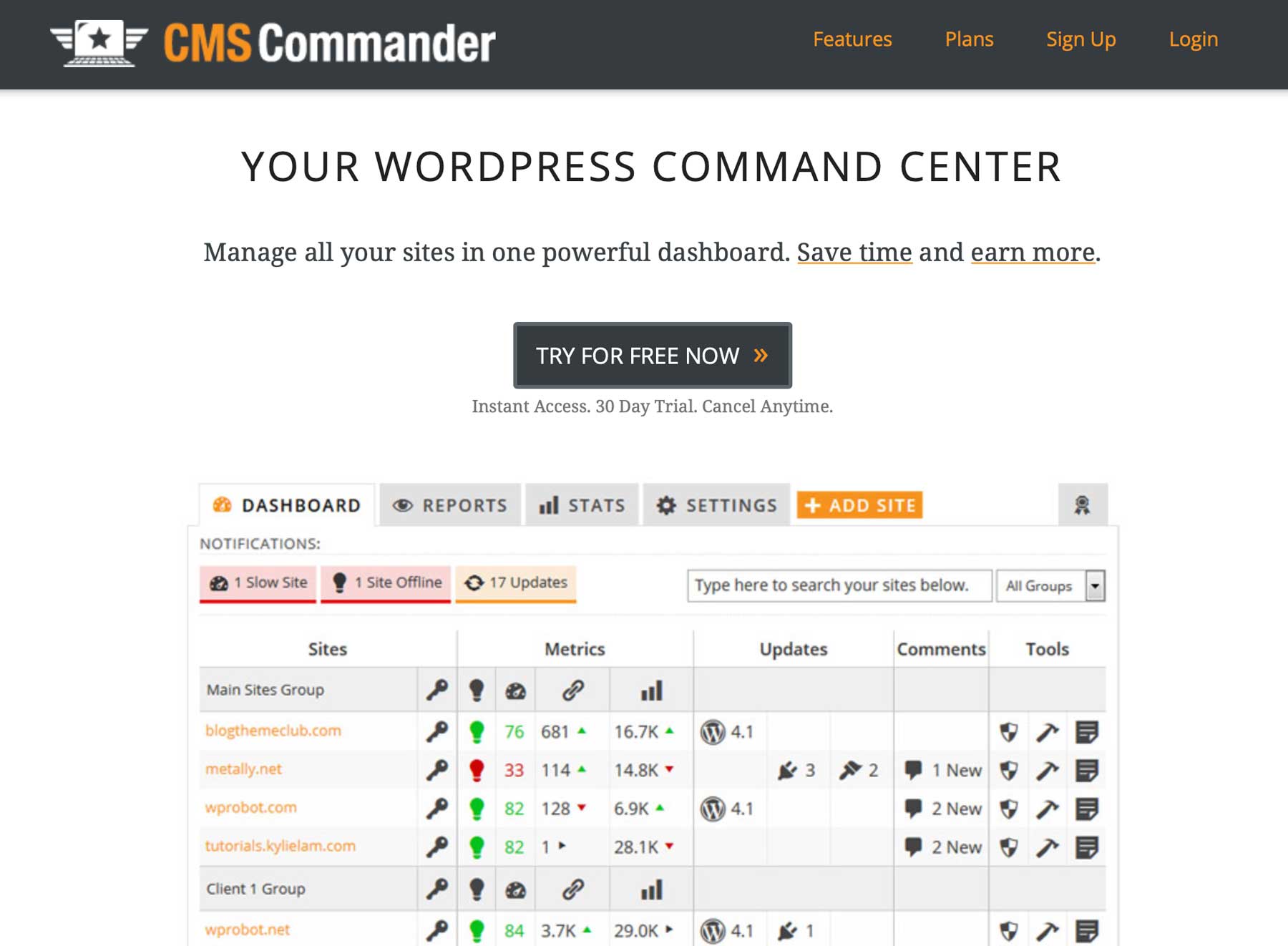
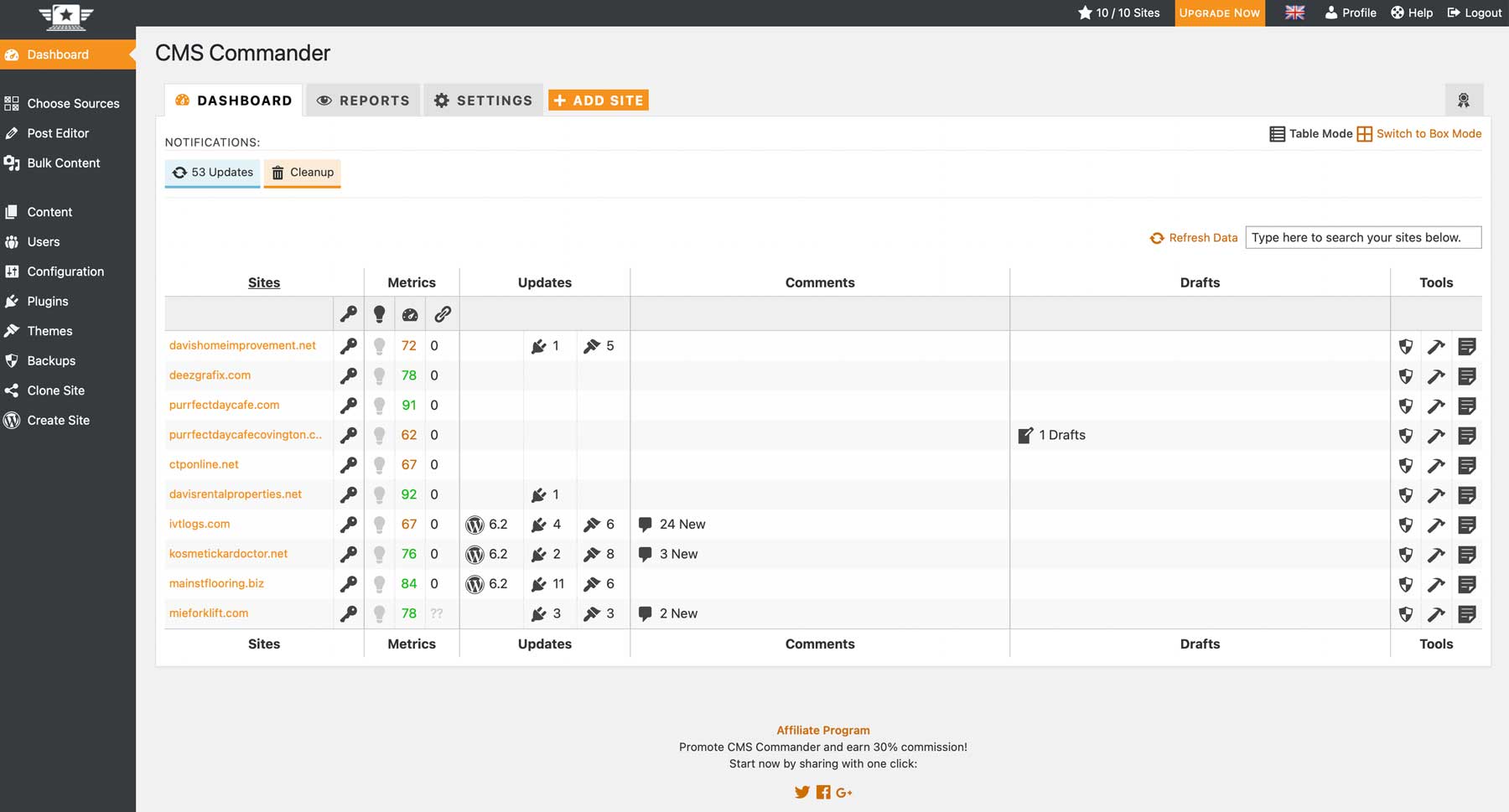


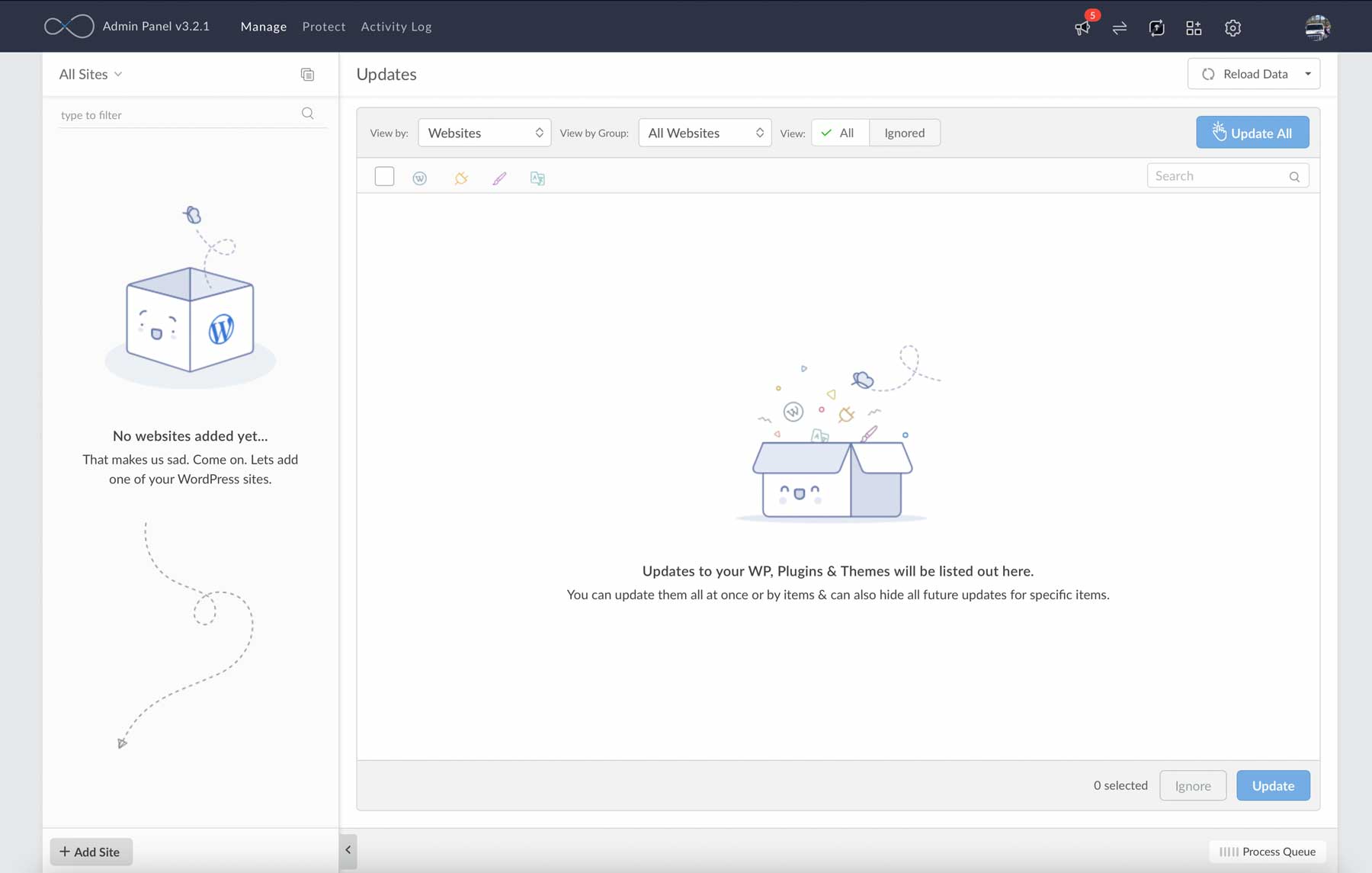







I have been using ManageWP for years. It has a lot of potential, but unfortunately, there appears to be no development on this tool anymore. For example… There have been some bugs that I have raised tickets about a few times over the years, but the replies are always the same, like “the nature of the issue doesn’t allow me to investigate further except to try to push the issue to resolution over at our developers. Which I did and hopefully this will be resolved in a timely manner” or “I just checked up on the status of this, and it appears that the issue still hasn’t been fixed. I have pinged our developer team in hopes of speeding things up a bit, but I am not able to provide an ETA on this. I hope that you understand.” These problems have existed literally for years. I remember quite a few years back when Godaddy acquired ManagWP and people were commenting that they were concerned that support and development would stop or get worse, and that appears to be exactly what has happened. It’s a shame because ManageWP could be so much better.